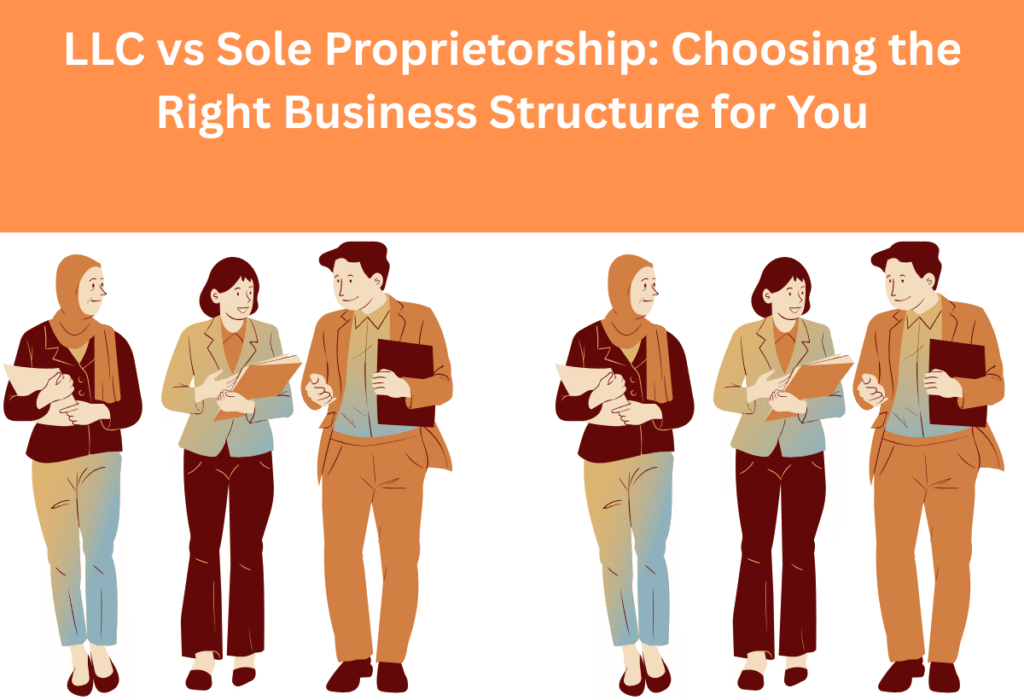When starting a business in the United States, one of the most important decisions you’ll make is choosing the right legal structure. For many entrepreneurs, the choice often comes down to two options: Limited Liability Company (LLC) or Sole Proprietorship.

Each structure has its pros and cons, and the best choice depends on your goals, risk tolerance, tax situation, and growth plans. In this article, we’ll compare LLCs and sole proprietorships across key factors like liability, taxes, ease of setup, and credibility—so you can make an informed decision.
What Is a Sole Proprietorship?
A sole proprietorship is the simplest and most common business structure in the U.S. It is an unincorporated business owned and operated by one individual. There’s no legal distinction between the owner and the business.
Key Features:
- Easy and inexpensive to start
- Owner reports income on their personal tax return
- Full control over business decisions
- Owner is personally liable for all business debts and obligations
What Is an LLC?
An LLC (Limited Liability Company) is a legal entity that is separate from its owner(s). It combines the liability protection of a corporation with the tax simplicity of a sole proprietorship or partnership.
Key Features:
- Offers limited liability protection
- Can be formed by one or more members
- Flexible management structure
- Pass-through taxation by default, but can elect to be taxed as an S Corp or C Corp
Comparison Table: LLC vs Sole Proprietorship
| Feature | LLC | Sole Proprietorship |
|---|---|---|
| Legal Entity | Separate legal entity | Not a separate legal entity |
| Liability Protection | Yes – protects personal assets | No – owner is personally liable |
| Taxation | Pass-through by default | Pass-through taxation |
| Ease of Formation | Requires state filing and fees | Very easy, often automatic |
| Credibility | More professional and trustworthy | Less formal, may appear less credible |
| Compliance Requirements | Annual reports and fees (in most states) | Minimal or none |
| Banking & EIN | Separate business bank account needed | Can use personal account (not recommended) |
When to Choose a Sole Proprietorship
You might prefer a sole proprietorship if:
- You’re starting small with low risk
- You want a quick and inexpensive setup
- You don’t plan to hire employees or raise investment
- You’re testing a business idea before formalizing it
When to Choose an LLC
An LLC may be the better option if:
- You want to protect your personal assets
- You’re working in a high-liability industry
- You want more credibility with clients or partners
- You plan to grow your business, hire employees, or raise capital
Tax Considerations
Both LLCs and sole proprietorships typically benefit from pass-through taxation, meaning the business itself does not pay federal income taxes. Instead, income is reported on the owner’s personal tax return.
However, LLCs offer greater flexibility in tax treatment. You can elect to have your LLC taxed as an S Corporation or C Corporation to potentially reduce self-employment taxes or take advantage of different deductions.
👉 Learn more from the IRS on LLC tax classification.
Liability and Legal Protection
This is perhaps the most important distinction. Sole proprietors are personally liable for any business debts, lawsuits, or losses. That means your home, car, and savings could be at risk.
LLCs, on the other hand, provide a legal shield—separating your personal finances from your business liabilities.
Final Thoughts
Choosing between an LLC and a sole proprietorship depends on your specific situation. If you’re starting a small, low-risk business and want to keep things simple, a sole proprietorship might be sufficient. But if you’re serious about protecting your personal assets, building credibility, and setting up a scalable structure, forming an LLC is likely the better move.
Before making a final decision, it’s a good idea to consult with a legal or tax advisor who understands your industry and goals. The right choice now can save you money, stress, and legal trouble down the road.